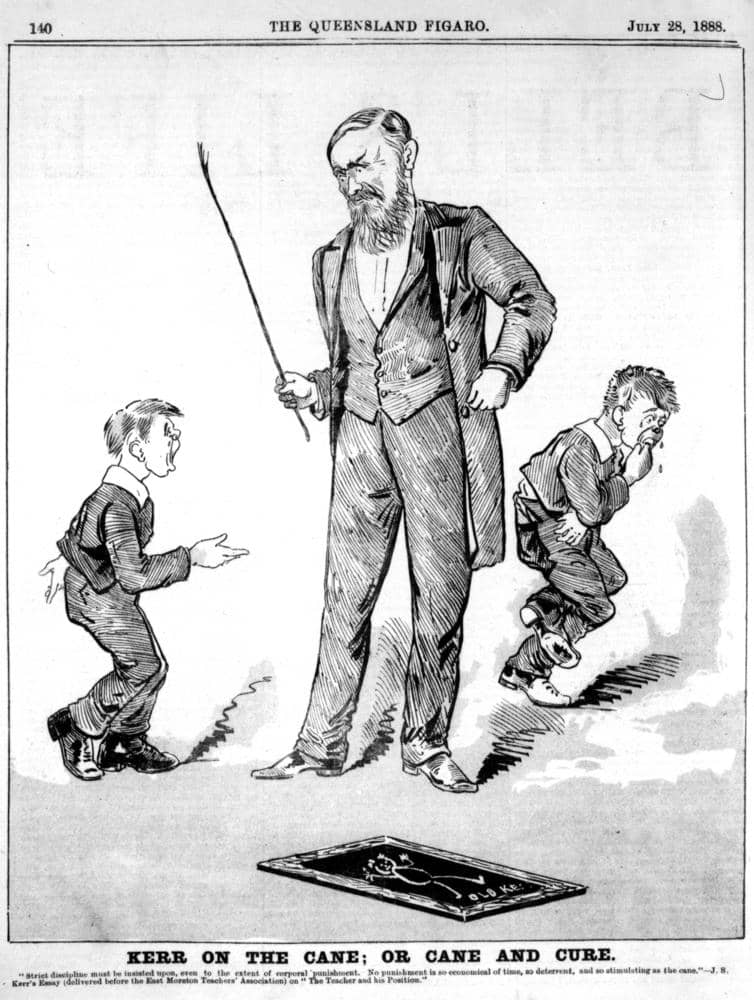In 1999, a young school girl was being punished in school. She was being punished starting at the age of 6, she was punished for small things like when she was in kindergarden there was a young boy copying off of her paper and she did not know, but when the teacher saw this boy looking at her paper, instead of just punishing him for cheating the teacher punished both of them because she said that she should have realized what was happening and put a stop to it. Instead, she was enabling her neighbor. Things like this happened for the rest of her schooling career. she said ¨I was spanked twice in school and more than that at home. Most of the time, I deserved it, and I learned from it. I wouldn’t be the person I am today driven, goal-oriented and confident in my own skin without my collective experiences.¨ these practices lead to shaping many of our fine leaders, teachers, and many people who we respect today.
Corporal punishment is a type of punishment allowing people to physically punish someone like parents or teachers. To help people strive and become a better version of themselves, created to shape mostly young people into stellar adults. Teachers would do this to students to help them learn from the mistakes that they were making, and parents would do this to teach them about how to act in the real world.
Early history of corporal punishment?
Corporal punishment was very common up until recently. in the past when schools or even at home would do this to their children they were not punished for it, it was legal to physically punish people if they felt necessary (mostly done at home and school).
back in the day a common way to punish people was with “flogging” this is usually either a whip or rod and it is used most often on the back of someone. Jesus was flogged before he was crucified, and it was a use of punishment on the british army and navy but, was abolished in 1881.
another form of corporal punishment was birching. this was when you would be beaten across the back of your head with twigs and branches usually used in schools and would sometimes be used in court if the person had committed a minor offense, this was also banned in 1948.
teacher up until the late 20th century would use corporal punishment in schools.
Modern history of corporal punishment?
Most people would partake in corporal punishment because that’s how they were raised and that is how they knew to do it but, were pleased with the outcome of doing it.
Until the late 20th century teachers were allowed to hit children. bamboo was a modern use of punishment against students in schools.
the ruler is probably the most commonly thought of when people think of corporal punishment but, it was only most commonly used in the 20th century. unlike what most people would think the teacher would usually hit someone on the hand with a ruler if they would need to be disciplined.
Throughout history most parents would hit their children. But in the 20th century and early 21st century, the people had gone against it and many countries have decided to ban it.
Do people actually do this?
People today would argue that corporal is a inhumane practice, and that it should not be allowed in today’s society, which is a valid argument but, there are many ways to disagree with that claim. Corporal punishment has been a big debate in our history and there are many people on both sides of it. It is still allowed in 69 countries including some places in the united states.
How many people do this?
Although there are many people who believe that corporal punishment is not acceptable, older generations are more accepting of corporal punishment with 88 percent of mature parents, 85 percent of baby boomers, 82 percent of Gen X parents, and 72 percent of Millennial parents approving of corporal punishment. Which shows that many of the people who endured punishment growing up are more open to the idea of continuing it on through their children, and more of the younger people who never experienced it themselves and do not understand how useful and effective it could be.
Is this even legal?

By: Theshibboleth
Nineteen states in the united states still allow it because the people in those states believe that it is a helpful practice, although many places have eradicated the use of physical punishment, it does not mean that everybody in those places do not agree with the use of it.
In a study conducted by professor Marjorie Gunnoe, he conducted that children who were spanked were more likely to do better in school that the other children who were not spanked, they were also more likely to do community work and go to college.
Throughout history until recently most parents hit their children. However in the late 20th century and early 21st century public opinion turned against corporal punishment and in many countries it has been banned.
Should you use corporal punishment?
Many people do not like the idea of corporal punishment, and I am not telling you that you should but, the facts are there that it has proven to help people. Some of our smartest people in our country we exposed to it, albert einstein known to be one of the smartest men in our country to ever live was alive in this time period although, never reported to have gone through corporal punishment there is a good chance that he did. Corporal punishment is a way to help shape people into better versions of themselves and help them learn and improve in everyday tasks and, I think that it should be brought back and made legal once again like we had originally had. it was a part of our history and i feel as if we should follow the way our ancestors found best to teach us.
Featured image: Queensland figaro






What do you think?
Show comments / Leave a comment